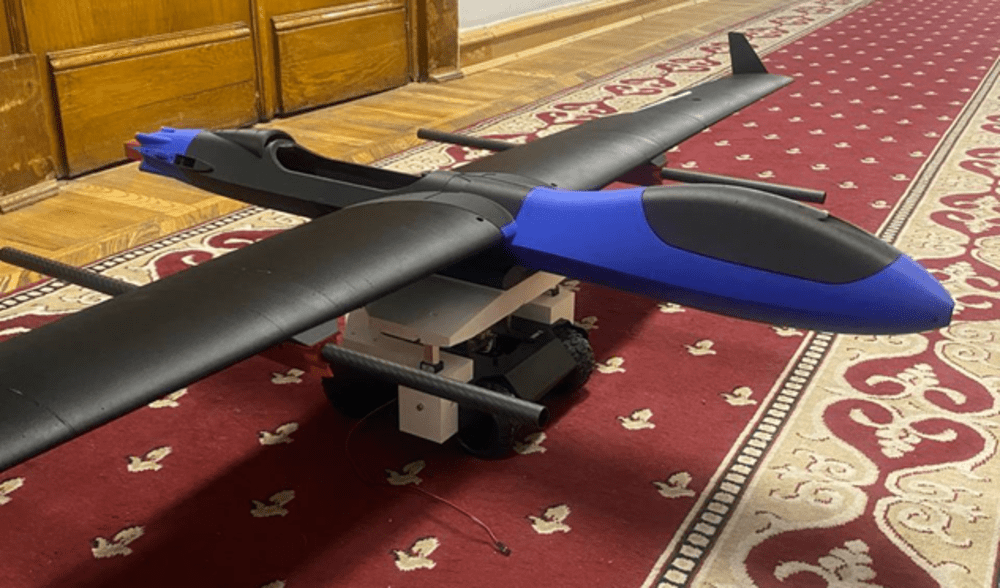Dronette is an innovative semi-autonomous drone system designed to deliver essential medicines and medical supplies to remote and hard-to-reach regions of Kazakhstan. The project addresses urgent logistical, ecological, and healthcare challenges, aiming to improve access to vital medical care while reducing environmental impact and ensuring early detection of environmental threats such as fires and pollution.
Many rural and mountainous areas in Kazakhstan lack reliable access to healthcare due to poor infrastructure and geographical isolation. Traditional transport methods are costly, slow, and often impossible during emergencies such as floods, snowstorms, or wildfires. Dronette proposes a lightweight, electricity-powered drone that can fly over difficult terrain and deliver small packages of medicine quickly, safely, and with minimal environmental footprint.
Dronette is equipped with both autonomous and manual flight modes. Using GPS, inertial sensors, and real-time obstacle detection (via LIDAR, ultrasonic sensors, and cameras), the drone can follow pre-programmed routes, avoid hazards, and land accurately. It features mid-route charging capability via wireless charging stations and includes an emergency landing system. The system is supported by a software interface for real-time operator supervision and intervention if needed.
In addition to delivery, Dronette includes an onboard neural network trained to detect fires, smoke, and human figures in distress. It can function as an environmental monitoring unit, scanning for signs of chemical leaks and pollution in air and water, thus supporting ecological safety efforts in vulnerable areas.
By replacing combustion-based logistics with clean electric drones, Dronette reduces CO₂ emissions by up to 54% compared to road transport. Early fire detection capabilities help reduce toxic emissions from forest fires and minimize ecological damage. The drone also aids in monitoring above-ground and underground water pollution, helping prevent contamination and preserve critical water resources.
The project proceeds in four stages:
- Design & R&D (1-3 months): Requirements gathering, hardware selection, and neural network development.
- Prototyping & Testing (4-6 months): Assembling the drone and initial test flights.
- Optimization (7-9 months): Refined design, expanded environmental functionality.
- Deployment & Scaling (10–12 months): Pilot launches in selected regions, operator training, feedback collection, and integration into public services.
Initial development costs are estimated at $15,000 with annual maintenance costs of $14,500. However, projected economic benefits-including reduced transportation and rescue costs-total $350,000 per year, leading to a payback period of just 20 days. This makes Dronette not only socially and environmentally valuable, but also financially sustainable.
The global medical drone delivery market is expected to grow to $4.6 billion by 2030. Dronette is well-positioned to enter this market due to its focus on both healthcare logistics and environmental monitoring. Potential clients include government health agencies, NGOs, disaster response organizations, and medical delivery services. The system also aligns with the UN Sustainable Development Goals by improving healthcare access, promoting clean technology, and enhancing emergency preparedness.
Dronette offers a unique, dual-purpose solution that merges healthcare delivery with environmental monitoring. It’s an innovative, scalable, and socially impactful project with strong potential for commercialization, positive environmental outcomes, and life-saving applications in underserved regions.
Like this entry?
-
About the Entrant
- Name:Kristina Mlikova
- Type of entry:teamTeam members:
- Kristina Mlikova
- Diana Butakova
- Alibek Nakhimov
- Rassul Tolengutov
- Yefim Mlikov
- Gholibjon Qasobov
- Software used for this entry:Autodesk Fusion 360, Bambu Studio, MATLAB, Visual Studio Code (Python)
- Patent status:none









